|
|
|
Sort Order |
|
|
|
Items / Page
|
|
|
|
|
|
|
| Srl | Item |
| 1 |
ID:
121608


|
|
|
|
|
| Publication |
2013.
|
| Summary/Abstract |
In "The Dog that Didn't Bark: The Role of Canines in the 2008 Campaign," Diana Mutz (2010) argues that dog ownership made voters significantly less likely to vote for Barack Obama in the 2008 presidential election. We examine this claim further. Although President Obama has owned a dog since shortly after his 2008 election, we argue that Bo's presence most likely did little to improve his owner's chances of being reelected in 2012. Rather, the apparent significance of dog ownership uncovered by Mutz is due largely to key variables being omitted from the analysis. Using the same data, we show that Obama didn't so much have trouble with dog owners in 2008 as he had trouble with conservative, rural, Southern whites, who, for reasons we examine, are more likely than other Americans to own dogs. Accordingly, we suspect that Bo failed to boost Obama's vote tally in 2012. While we recognize the tongue-in-jowl tone of portions of Mutz's article, this tale is an important one, and is consistent with recent research linking racial attitudes to levels of support for Barack Obama. We also argue that while scholars are often wise to include control variables such as "South" in studies of political attitudes and behavior, it is important to consider the variety of politically relevant characteristics that such variables may be capturing.
|
|
|
|
|
|
|
|
|
|
|
|
|
|
|
|
| 2 |
ID:
149360


|
|
|
|
|
| Summary/Abstract |
College students are young, have little or no history of voting, and are residentially mobile, which makes them a population in great need of registering to vote. Universities have a civic, pedagogical, and legal obligation to register their students to vote. In 2006, we conducted a controlled experiment across 16 college campuses to test the efficacy of classroom presentations to increase voter registration. The 25,256 students across more than 1,026 classrooms were randomly assigned to one of three conditions: (1) a control group receiving no presentation; (2) a presentation by a professor; and (3) a presentation by a student volunteer. Verifying registration and voter turnout from a national voter database, we found that both types of presentations increased overall registration by 6 percentage points and turnout rates by approximately 2.6 percentage points. These results demonstrated that universities can take simple steps to engage their students in politics.
|
|
|
|
|
|
|
|
|
|
|
|
|
|
|
|
| 3 |
ID:
121829
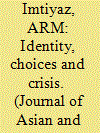

|
|
|
|
|
| Publication |
2013.
|
| Summary/Abstract |
This study attempts to understand the choices made by Muslim political leaders in general, and after independence in particular. Muslim leadership has been broadly classified into two categories based on their respective agendas. This paper looks critically at the choices made by Muslim leaders, as well as some state concessions that could have contributed to growing Islamic fundamentalism. It finally suggests some measures to the current problems of (North and East) Muslims: socio-economic concessions and local power-sharing.
|
|
|
|
|
|
|
|
|
|
|
|
|
|
|
|
| 4 |
ID:
149240


|
|
|
|
|
| Summary/Abstract |
The distribution of voting rights in the UK is an artefact of history rather than a product of clear legal or philosophical principles. Consequently, some resident aliens (i.e. immigrants) have the right to vote in all UK elections; others can vote in local elections but are excluded from national elections; still others are excluded from all elections. In England and Wales alone, roughly 2.3 million immigrants are excluded from voting in national elections. This exclusion is inconsistent with the founding principle of democracy and distorts political discourse. What if all immigrants could vote in national elections? We estimate that up to ninety-five parliamentary seats could have been won by a different party in the 2015 general election. More substantially, enfranchising all immigrants would require re-drawing UK constituency boundaries. The new electoral map would increase the relative power of urban constituencies and would incentivise some political entrepreneurs and parties to temper anti-immigration rhetoric.
|
|
|
|
|
|
|
|
|
|
|
|
|
|
|
|
| 5 |
ID:
111576
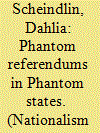

|
|
|
|
|
| Publication |
2012.
|
| Summary/Abstract |
This study examines the widespread use of referendums in entities that have declared statehood unilaterally but are not generally recognized or accepted as sovereign entities. Referendums in this situation pose a problem: to the voters, they are sufficiently a meaningful political process to warrant participation. Yet, to outsiders-including actors who may have large influence over whether the referendum's political goal can be implemented-the entire process may be meaningless. This article argues that the referendum process is not meaningless but symbolic: It fills the space between actual and desired political reality for the entities who vote. Drawing on referendum experiences in seven phantom states, the research shows that the referendums play a critical role in articulating political intentions, staking out a self-determination or sovereignty claim, displaying democratic legitimacy and forging international divisions and coalitions. Even not holding a referendum has a symbolic meaning regarding the political goals of an incomplete entity. I argue that not only can referendums signal these meanings but they can contribute to making political goals increasingly real.
|
|
|
|
|
|
|
|
|
|
|
|
|
|
|
|
| 6 |
ID:
106730


|
|
|
| 7 |
ID:
094972


|
|
|
|
|
| Publication |
2010.
|
| Summary/Abstract |
Recent research on the European Parliament (EP) has neglected the idiosyncrasies of niche parties. Similarly, analyses of niche parties have not fully engaged the literature on the EP. This article builds on both literatures by analysing niche party behaviour in the EP as a distinct phenomenon. It is argued that niche parties will respond differently to institutional stimuli than parties more generally. To test this argument, Hix, Noury and Roland's work on EP party voting behaviour is replicated concentrating on niche parties only. It is found that participation in national government and institutional changes affect niche party legislators' voting behaviour, whereas they do not for legislators in the EP overall. These results have important implications for understanding both party behaviour in the EP and niche party behaviour more generally.
|
|
|
|
|
|
|
|
|
|
|
|
|
|
|
|
| 8 |
ID:
149668
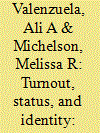

|
|
|
|
|
| Summary/Abstract |
The rise of micro-targeting in American elections raises new questions about the effects of identity-based mobilization strategies. In this article, we bring together theories of expressive voting with literature on racial and ethnic identification to argue that prior studies, which have found either weak or null effects of identity messages targeting minority groups, have missed a crucial moderating variable—identity strength—that varies across both individuals and communities. Identity appeals can have powerful effects on turnout, but only when they target politicized identities to which individuals hold strong prior attachments. Using two innovative GOTV field experiments that rely on publicly available data as a proxy for identity strength, we show that the effects of both ethnic and national identity appeals among Latinos in California and Texas are conditional on the strength of those identities in different communities and among different Latino subgroups.
|
|
|
|
|
|
|
|
|
|
|
|
|
|
|
|
| 9 |
ID:
088433
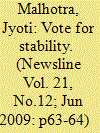

|
|
|
| 10 |
ID:
094792


|
|
|
| 11 |
ID:
146193
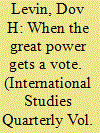

|
|
|
|
|
| Summary/Abstract |
What are the electoral consequences of attempts by great powers to intervene in a partisan manner in another country’s elections? Great powers frequently deploy partisan electoral interventions as a major foreign policy tool. For example, the U.S. and the USSR/Russia have intervened in one of every nine competitive national level executive elections between 1946 and 2000. However, scant scholarly research has been conducted about their effects on the election results in the target. I argue that such interventions usually significantly increase the electoral chances of the aided candidate and that overt interventions are more effective than covert interventions. I then test these hypotheses utilizing a new, original dataset of all U.S. and USSR/Russian partisan electoral interventions between 1946 and 2000. I find strong support for both arguments.
|
|
|
|
|
|
|
|
|
|
|
|
|
|
|
|
|
|
|
|
|